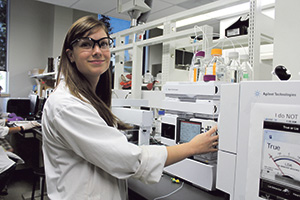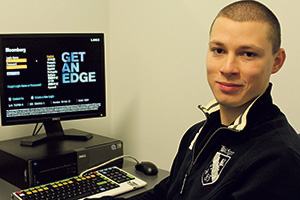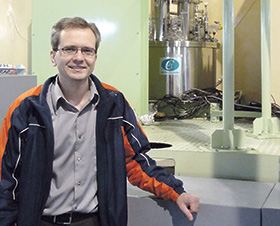Future Fund
Investing in Academic Excellence and Innovation
The goal of the Future Fund is to raise $15 million to provide The University of Winnipeg with flexible and critical resources required to execute our current academic priorities, while building a secure foundation for the future. Our vision is to encourage academic excellence and innovation grounded in community.
The Future Fund supports activities such as faculty research, academic enhancements and development, innovative programming, creation of Chairs and Fellowships, and specialized technology investments. The Future Fund allows for enriched student and faculty experiences, gained through participation in national and international competitions, case studies, exchanges and conferences.
Donations to The University of Winnipeg’s Future Fund strengthen our Faculties and Programs by supporting the following areas:
Academic research by professors and students in established and emerging fields that benefits the broader community, for example: health and wellness (concussions in youth, community diabetes awareness and education, anti-bullying programs for schools), production of medical isotopes, housing solutions for Winnipeg’s homeless population, business research on process improvements, branding and consumer choice, economic and finance research on performance and regulatory environments.
Academic collaboration through conferences and distinguished lectures that are open to the public on critically important topics such as climate change and Manitoba’s north, human rights, Indigenous identity. It also allows more UWinnipeg scholars to attend global conferences and bring home to Manitoba cutting edge ideas and applications. Collaboration includes agreements with institutions internationally for student exchanges, participation in internship programs where youth can learn through experimentation and direct input into community development. The result is the development of a cohort of students who better understand global issues and are prepared to play an important leadership role in firms and organizations well into the future.
Innovative academic programming supports our approach to learning including experiential learning opportunities for students, programs that are better connected to the requirements of the workforce, and a commitment to life-long learning. It means connecting research with the community in visible ways such as UWinnipeg’s Seniors Well Being program which promotes physical activity combined with an education component; the Urban and Inner City Studies program located on Selkirk Avenue; and using new research models that can be applied to issues surrounding new immigrant settlement and integration, Aboriginal education, inner-city housing, community mentoring programs that facilitate the integration of youth into the academic environment. It allows for Summer Institutes with international guest lecturers, summer research in places like Churchill, and faculty-led overseas field courses such as those sponsored by Global College to South Africa and El Salvador, strengthening the only human rights degree program in Western Canada.
Technology investments for upgrades to digital learning tools, equipment and software that allow the university community to remain a current and competitive on-line environment. Utilization of new economy tools including an investment in databases where students and faculty members can perform research and prepare better assessments, providing students with opportunities to understand the value of information and communication technology tools.
Faculty, staff and student recruitment allows Manitoba to continue to attract and retain the best and the brightest scholars and professionals. This includes the development of Centres and Institutes where UWinnipeg and Manitoba can play a key role in developing clusters of knowledge and academic programs, for example, UWinnipeg currently has the Centre for Forest Interdisciplinary Research; Centre for Research in Young People's Texts and Cultures; CN Indigenous Resource Centre; and the Cisco Innovation Centre for Collaborative Technologies.
Specialized scholarship allows for the appointment of specialty funded Chairs and Research Fellowships. The purpose of university Chairs is to attract, recognize and retain scholars who are acknowledged by their peers as being pre-eminent in their research fields. For example, UWinnipeg has the Chair in Co-operative Enterprises (new); Chair in Mennonite Studies; Chair in United Nations Studies; Chair in Contemporary Theology; Chair in German Canadian Studies as well as five Canada Research Chairs in: Environmental Toxicology; Fundamental Symmetries in Subatomic Physics; Science Education in Cultural Contexts; Young People’s Texts and Cultures; Inner-City Issues, Community Learning, and Engagement.
Research Fellowships are designed to recruit and support faculty of exceptional promise, for example UWinnipeg has the endowed H. Sanford Riley Fellowship in Canadian History; the Dr. Andrew Moore Traveling Fellowship; and the Harrington Fellowship
Future Fund in Action
- Dr. Wendy Josephson, Professor, Department of Psychology is part of a network of 62 Canadian researchers and 52 youth-focused organizations that work together to reduce bullying. Her major focus is to apply research findings to solve bullying problems in children’s real lives, and working with the Family Channel to develop events, activities, and resource materials for schools to use to reduce bullying.

- Student Clare McConkey, Master’s in Environmental Chemistry, is conducting research on human blood samples to determine how much Teflon is in our bodies; inside the Richardson College for the Environment and Science Complex, one of the best educational facilities of its kind in Canada.
- UWinnipeg’s Master's in Development Practice in Indigenous Governance is unique in the world. In partnership with the MacArthur Foundation and as part of a global network of 25 leading universities, the focus is on applied learning in the fields of natural sciences, social sciences, health, and management.
- Igor Udovenko is a 4th year Economics student competing in the Chartered Financial Analysts challenge, using the recently acquired Bloomberg dataset located inside UWinnipeg'’s Buhler Centre. He hopes to become an investment analyst when he graduates.
Igor Udovenko is a 4th year Economics student competing in the Chartered Financial Analysts challenge, using the recently acquired Bloomberg dataset located inside UWinnipeg'’s Buhler Centre. He hopes to become an investment analyst when he graduates.
“The Bloomberg terminal is actually an entire data service, it provides a large variety of data on asset prices, company information and executive teams. It helps me gather the information I need to be competitive by providing market changes by the second in real time for tens of thousands of securities.”
- Kerrie Hayes graduated from UWinnipeg in June 2012, with a Master of Science in BioScience, Technology and Public Policy, and now works for the Manitoba government with the department of Innovation, Energy and Mines, specifically in the area of Life Sciences and Environmental Technologies.
"While at UWinnipeg I worked on the early detection of Alzheimer’s disease, important research because as our population ages, dementia and Alzheimer’s disease in the elderly will be a major concern for our health care system. The best part about doing this research is getting to meet with and work with experts in the field and fellow students. It has better equipped me to understand the science behind the companies doing business in Manitoba in these areas.”

- Dr. Jeff Martin, Physics Professor and Canada Research Chair in Subatomic Physics, leads a team exploring a Prairie solution to the shortage of medical isotopes for cancer tests.
- Since 2 008, the Centre for Research in Young Peoples Texts and Cultures (CRYTC) has been managing the development of a picture book for young people about the life of, Kayosochi Kikawenow, Our Mother from Long Ago, a young Cree woman who lived in northern Manitoba in the late-seventeenth century and whose burial site was discovered in 1993. Mavis Reimer and Deborah Schnitzer, scholars from the Centre, have been working in collaboration with William Dumas, storyteller and educator, and a group of scholars and educators from the University of Winnipeg, the Manitoba Museum, and the Government of Manitoba.
008, the Centre for Research in Young Peoples Texts and Cultures (CRYTC) has been managing the development of a picture book for young people about the life of, Kayosochi Kikawenow, Our Mother from Long Ago, a young Cree woman who lived in northern Manitoba in the late-seventeenth century and whose burial site was discovered in 1993. Mavis Reimer and Deborah Schnitzer, scholars from the Centre, have been working in collaboration with William Dumas, storyteller and educator, and a group of scholars and educators from the University of Winnipeg, the Manitoba Museum, and the Government of Manitoba.
In addition, this collaborative group has consulted with several land-based members of the South Indian Lake community regarding mapping, traditional cultural activities, language, and land use. This picture book, entitled Pīsim Finds Her Miskanow and illustrated by Leonard Paul is now in production at Portage & Main Press with a publication date set for 2013. For more information about CRYTC click here.
Thank You Donors!
Donations to the Future Fund enable UWinnipeg to be responsive to the ever changing requirements of a modern University and to provide a superior learning environment for our students. The Future Fund empowers the President and the Deans to supply the necessary funding to the entire campus providing students, faculty and researchers the resources to dream, to learn, to discover and to capitalize on emerging opportunities and the pressing needs to strengthen academic and student life programs as they arise — moving UWinnipeg towards the future. If you are inspired to give to the Future Fund please click here and choose the Faculty Funds drop down menu.
We are extremely grateful for the overwhelming support we've received for this initiative. To date over $400,000 has been contributed by generous donors to the Future Fund - thank you!
To view a complete list of donors, please click here.
Updated on November 14, 2014
